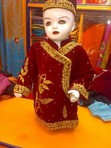K.C. Bhatt's Blog, page 6
June 27, 2016
Burmese days: A review
A review of Burmese days by George Orwell
The most unflattering account of India and its people is there in ‘Burmese days’. The authenticity of the book is stunning. George Orwell saw things far more clearly than even Forster, who totally ignored Hindus for they appeared mysterious to him, besides noting passingly Dr. Godse.
On the reverse side, the Gorge Orwell’s book presents the colonials in even poorer light. The true nature of colonialism and its soul-sapping decadence and corrupting influence on both the parties is pity-provoking.
You simply can not detest the British underclass, representing the face of colonials in India. They are capable of inflicting the severest violence on the natives to prove their loyalty to the Raj and win promotions, while they are distressed by their financial worries, childrens’ education or their future, once they complete their tenure in India.
For the ones not married yet, finding a suitable English match is almost out of question. At best they will find a woman who is considered too low in Britain and fit to be a servant only, or fit to marry a British man serving in India.
Then you have orphaned and destitute English young woman coming to India looking for a husband.
(Such was the tyranny at home and Orwell went out looking for it all over the places to begin his revolution.)
The prospects of joining the retirees’ ghetto of British-Indian servicemen in England is the another loathsome inevitability at the end of a such a career.
That is, if an uprising of natives does not annihilate them before that.
They drink and indulge excessively to keep their minds off the dirty work they are doing here in most cases. Then there is the fear of tropical diseases.
From the first sentence it holds you by your neck and hits you with brilliance almost relentlessly.
He was disillusioned of his job and despaired as a writer to almost kill himself by smoking while writing 1984. He had weak lungs and a TB and lived a life of exile mostly. For his writing rendered him an alien in Britain.
To this day few writers have the courage to follow his legacy and Britain reads and produces occult-fiction or mommy porn mostly, if it not regales in foreign cultures.
The concept of home guard he suggested and the government adopted during the WWII gave him a hope that a revolt will take place in Britain itself, with millions of armed civilians. But he failed to see that British people were incapable of it, being very tribal by nature.
Before that he joined the Spanish civil war to fight the tyranny and got nearly killed. His personal life says that he was a born revolutionary with no true comrade. So writing was the last resort to him though it earned him very little to ever get settled in life. Today his works earn millions of pound in royalties.
It is the most forthcoming narrative of the writer where he doesn’t hide behind many symbols or allusions. Which is the case with his later work which was more celebrated than his first.
Though it is about Burma rather than India, it is almost about every country ever colonised.
On 8 June 2016
A review of Burmese days by George Orwell
The most unflattering account of India and its people is there in ‘Burmese days’. The authenticity of the book is stunning. George Orwell saw things far more clearly than even Forster, who totally ignored Hindus for they appeared mysterious to him, besides noting passingly Dr. Godse.
On the reverse side, the Gorge Orwell’s book presents the colonials in even poorer light. The true nature of colonialism and its soul-sapping decadence and corrupting influence on both the parties is pity-provoking.
You simply can not detest the British underclass, representing the face of colonials in India. They are capable of inflicting the severest violence on the natives to prove their loyalty to the Raj and win promotions, while they are distressed by their financial worries, childrens’ education or their future, once they complete their tenure in India.
For the ones not married yet, finding a suitable English match is almost out of question. At best they will find a woman who is considered too low in Britain and fit to be a servant only, or fit to marry a British man serving in India.
Then you have orphaned and destitute English young woman coming to India looking for a husband.
(Such was the tyranny at home and Orwell went out looking for it all over the places to begin his revolution.)
The prospects of joining the retirees’ ghetto of British-Indian servicemen in England is the another loathsome inevitability at the end of a such a career.
That is, if an uprising of natives does not annihilate them before that.
They drink and indulge excessively to keep their minds off the dirty work they are doing here in most cases. Then there is the fear of tropical diseases.
From the first sentence it holds you by your neck and hits you with brilliance almost relentlessly.
He was disillusioned of his job and despaired as a writer to almost kill himself by smoking while writing 1984. He had weak lungs and a TB and lived a life of exile mostly. For his writing rendered him an alien in Britain.
To this day few writers have the courage to follow his legacy and Britain reads and produces occult-fiction or mommy porn mostly, if it not regales in foreign cultures.
The concept of home guard he suggested and the government adopted during the WWII gave him a hope that a revolt will take place in Britain itself, with millions of armed civilians. But he failed to see that British people were incapable of it, being very tribal by nature.
Before that he joined the Spanish civil war to fight the tyranny and got nearly killed. His personal life says that he was a born revolutionary with no true comrade. So writing was the last resort to him though it earned him very little to ever get settled in life. Today his works earn millions of pound in royalties.
It is the most forthcoming narrative of the writer where he doesn’t hide behind many symbols or allusions. Which is the case with his later work which was more celebrated than his first.
Though it is about Burma rather than India, it is almost about every country ever colonised.
The ending disappointed a bit. For neither Flory is that sensitive a soul to commit suicide after killing his pet dog when he was rejected by Elizabeth for the second time after his disposed Burmese mistress creates a scene in a church gathering. He was never that proud of his Englishness that the rejection of an English woman, who is an orphan and a destitute and is desperate to find a husband in India after finding none at home.
On the part of Elizabeth too, the second rejection of Flory is too much over done with. More so since she already rejected Flory for the same reason earlier and then accepted back after she herself was rejected by the military officer Varrell, who she and her aunt were prospecting for her husband. Flory was rejected first time as soon Varell arrives in the town and is accepted back as soon Varrell leaves without saying a goodbye to anyone after his month long stay in the town, durinf which he took out Elizabeth almost every evening but never proposed the marriage Elizabeth wanted from him so badly.
In the meanwhile the uncle who gives her shelter in Burma has repeatedly tried to rape her.
All British characters are too practical in the book for they are from the underclass at home and are out there to make a career in British Raj in India. When they appeared inordinately principled in the end of the book, it looked disingenuous to say the least.
If it was created to make the end dramatic it has failed completely. If it was done to uphold the uprightness and pride of British colonials it again fails miserably. For the book gave away a great deal earlier on that count.


November 21, 2015
Writing and reading
Writing and reading are essentially private matters. It is the personal striving, suffering and rejoicing. Crowd is only distracting. Many a writing courses have tried to make it communal. The result has been a disaster.


November 14, 2015
Load and shed.
October 14, 2015
Authors at work
The thought that they are there and working to entertain you is a relief. Without them all kinds of moorings might have been severed. It would have been impossible to connect.


July 13, 2015
Ideas and poverty
June 15, 2015
Crazy media
April 28, 2015
Words
April 18, 2015
Promotional free copy
April 15, 2015
Changed politics
Chinese economy has grown by a meagre 7% last quarter. Though Europe is in recession and The USA has just managed to keep its head above water, has world reached a place from where things only look downwards? Will the second biggest economy be able to pull the world out of a certain doom?
The politics today is almost working at bringing things further down. It is wounding itself in the hope to do damage elsewhere (read China).
I see the things changing the course with a popular mandate everywhere. People know what is the best thing to do in such a scenario. A new breed of politicians looks about to rise to change the moribund state of the affairs.















